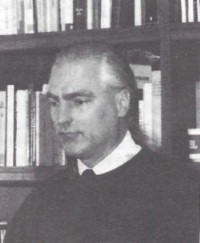From the Editor
We are sometimes asked why we devote so much effort to the Holocaust issue. No, it’s not some bizarre obsession. We do so because, by any objective standard, “the Holocaust” has come to play a very important role in our society. The wartime fate of Europe’s Jews is treated not as another chapter of history, but rather as the most polemicized and politicized pseudo-religious icon of the present. (This is manifest, for example, in the official US Holocaust Memorial Museum in Washington, DC. By the time readers receive this issue, it will have been opened with great media fanfare.)
We also deal with this issue because others are unable or unwilling to so conscientiously take on the largely thankless work of challenging this taboo.
The Holocaust issue is a primary reason that the IHR came into being, and it is especially because of our thoughtful and informed treatment of this issue over the years that the IHR and its Journal have had such a remarkable impact – far out of proportion to our modest resources and circulation. For better or worse, our dedication to the task of combatting historical myth and stereotype demands that we continue to deal with this issue.
“Politically Correct” Fiasco
Nothing better illustrates the way that the Holocaust story is exploited to promote other aspects of the “politically correct” agenda than the much-heralded “Liberators” film and book project. As we report in this issue’s lead article, this “documentary” film was launched in New York with applause and support from the cultural and political elite, including the federal government’s US Holocaust Memorial Council.
It didn’t take long, though, for the project’s glaring defects to become embarrassingly obvious. A central claim of “Liberators” was quickly shown to be a lie: black American soldiers did not liberate the Dachau and Buchenwald concentration camps.
Butz on Pressac
An impressive (and arguably the most scholarly) effort to refute Revisionist arguments has been the detailed 564-page book on Auschwitz by French pharmacist J.-C. Pressac. Published in 1989 by the Klarsfeld Foundation, it was meant to be the definitive response to the Revisionist view of the Auschwitz extermination story. If nothing else, Pressac’s book proves – contrary to what is sometimes asserted – that there is indeed a real debate among thoughtful men and women of good will about what actually happened at Auschwitz. In keeping with our commitment to publish solidly-researched writing on the Holocaust issue, we are pleased to present here a closely argued response to the Pressac book by Dr. Arthur Butz.
Victory in Texas
Also in this issue, Theodore O’Keefe describes the victory at the University of Texas (Austin) by the Smith/Cole Revisionist “Campus Project,” which prevailed in spite of a “full court press” of intimidation and pressure by the very inappropriately named Anti-Defamation League of B’nai B’rith. And in Canada, as we also happy to report, the government has affirmed that Holocaust Revisionism is not “hate speech.”
Setbacks
We also tell about two recent setbacks: The decision by politicians in Australia to bar British historian David Irving – whose works can be found in any good-sized bookstore or library in the country – and the recantation by French scholar Bernard Notin of his heretical views on the Holocaust.
The Notin case is particularly instructive. The forces of bigotry mobilized a campaign of threat and persecution against the French professor’s livelihood and perhaps even his life – all because he had expressed dissident views on the most sacred dogma of our time in just a few lines in an article published in a rather obscure scholarly journal.
But the Irving and Notin cases are no cause for discouragement. As inevitable as they are temporary, such setbacks are actually signs of progress. Whenever a new awareness with profound social-political implications threatens a prevailing ideological dogma, the powers that be inevitably resort to drastic measures – including government bans and physical violence – to defend their privilege and power. Unable to respond convincingly to Revisionist arguments with fact and logic, our increasingly desperate adversaries turn to such extreme measures precisely because they are so alarmed at the very real progress we have been making.
“New” Journal
As we had hoped, response to the new-format Journal has generally been very positive. Readers tell us that they find it more attractive and easier to read. We are also happy to report that Journal circulation has sharply increased as a result of recent promotional work, including a mailing to 5,000 libraries in the United States and Canada. Book sales have likewise been brisk in recent months, due in large part to promotional mailings.
Our book publishing work also continues. For example, we are happy to announce that F.J.P. Veale’s acclaimed classic, Advance to Barbarism, is back in print in a handsome new IHR edition that should be available in June. A new edition of Garet Garrett’s classic Burden of Empire – a work that originally appeared under the title The People’s Pottage – will soon also be available.
An Introduction
Finally, a belated introduction: Although Greg Raven has been serving as Journal Associate Editor since the January–February issue, and those who attended the October 1992 IHR Conference were able to meet him (and his charming wife) in person there, he has not yet been introduced to our readers.
Born in 1953, he has lived most of his life in southern California. Since he began making his living as a writer in the late 1970s, he has turned out sales materials, radio plays, stand-up comedy, numerous magazine articles, computer documentation manuals, reviews, and two books. He has proven a tremendous help since he began working here in September 1992. All of us at the IHR have also come to appreciate his positive attitude, his ready wit, and his unflappable sense of humor.
Bibliographic information about this document: The Journal of Historical Review, vol. 13, no. 3 (May/June 1993), pp. 2f.
Other contributors to this document: n/a
Editor’s comments: n/a

